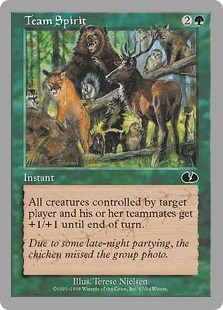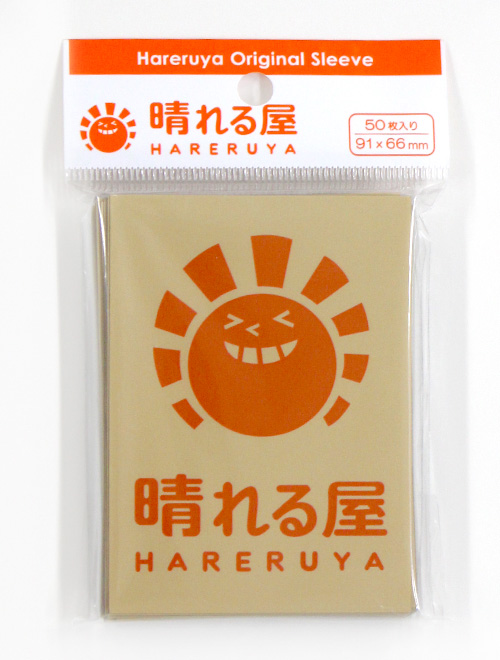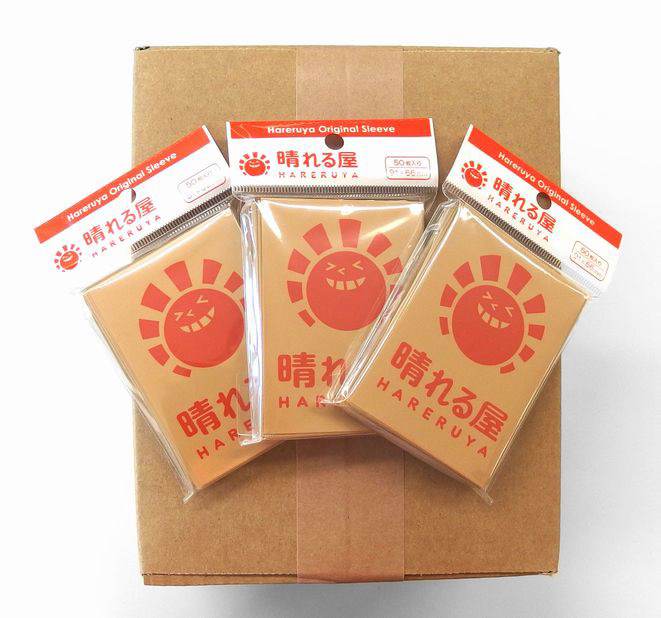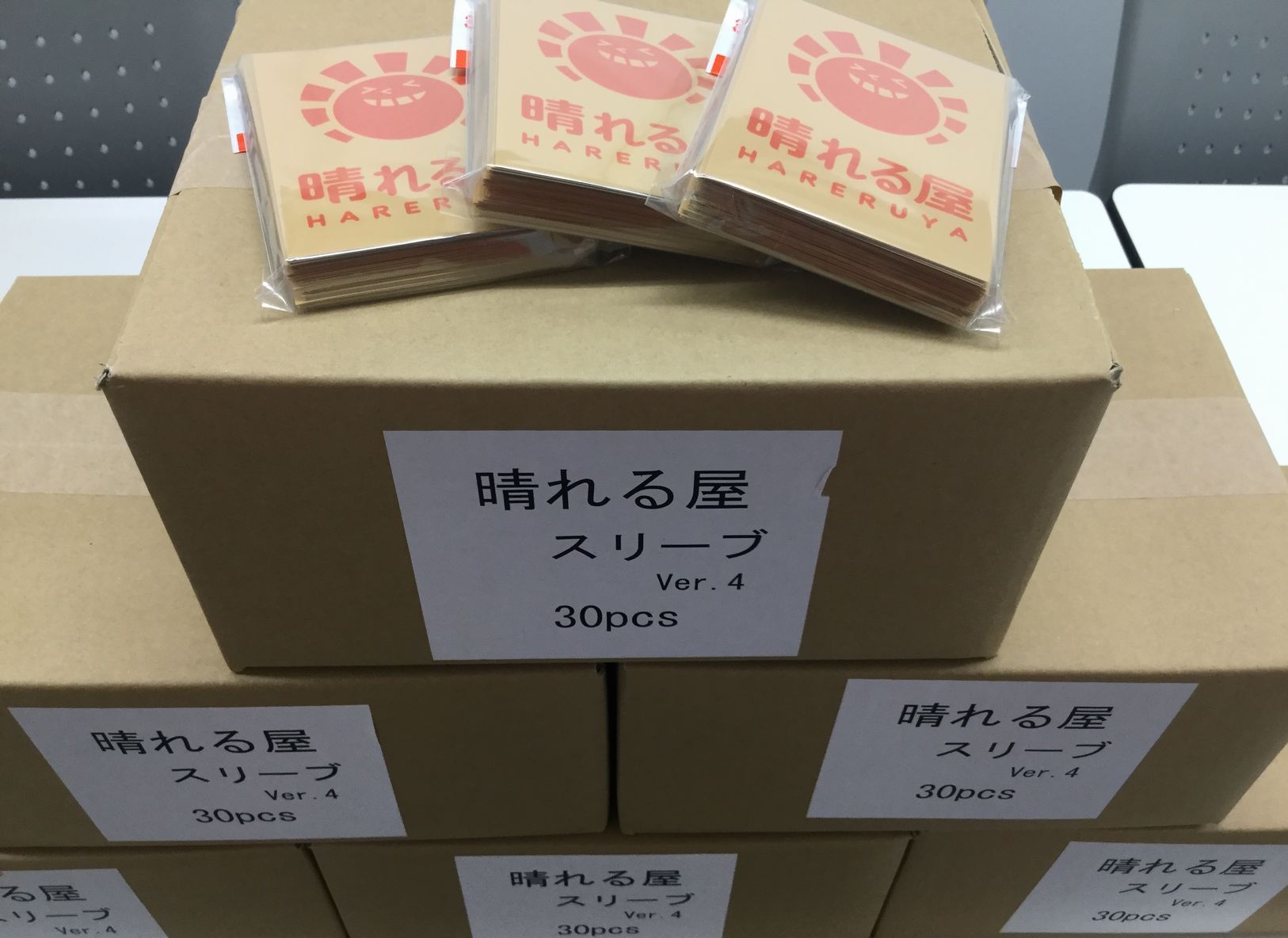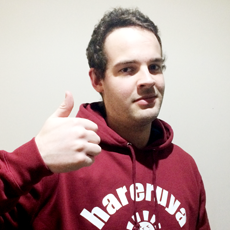Team Limited Grand Prix is the fan favourite format for a lot of the MTG player base. It is a lot of fun and it gives you the possibility to make this individual game into a team game like the Davis cup does for Tennis. The collaboration between three individual minds. The celebration of friendship and a commitment to each other. In a team, you are sharing emotions with friends, everything gets more intense. And winning together is one of the best feelings there is in magic.
The happiness of making a TEAM GP top 4:
Yes, this is Team Limited, it’s less about the cards and it’s more about the people you chose to play with.
1. Choosing your teammates
The most important rule when choosing your teammates is respect. I have seen this a lot of time. Even if they are good friends, a lot of teams makes the same big mistake: compete with each other for who is the best. Ego always kills the team spirit. Players could be great individually, this should not become a problem. Players should not try to show off or aim to be better than their teammates. Team spirit is not about this. Player should already have the respect of their teammates and have nothing to prove too them. The tournament is not a competition between teammates but against other teams.
One of the keys to success is players believing in their teammates. Trust your teammates and focus of your own game. Your concentration will be much better if you play only your game. Having team mates, you really respect as players and totally trust, it makes their losses easier to accept. You know they are good and gave their best, no need to be angry about the results. But it is not enough, each player should respond to their teammates trust & confidence in their ability and prepare accordingly to the best of their ability for the tournament.
2. Individual points
As usual practice is one of the keys to success. Most of the time it will be hard to meet and practice team limited. It is a team tournament but you have individual games to play and if you want to be able to play well you should practice, even if you do it alone.
Trusting your team doesn’t mean to hope they win it for you. Your motivation should be to win as a team and not as individuals. It is lucky to lose the match and win the round because your mates won, but it should not be a good feeling. You don’t want to be this guy. It is better when you are one of the two players who won. Even if you are the only one who wins his match, you will still feel like you did your duty for the team. It is important the whole team is focused on their own games.
3. Deckbuilding
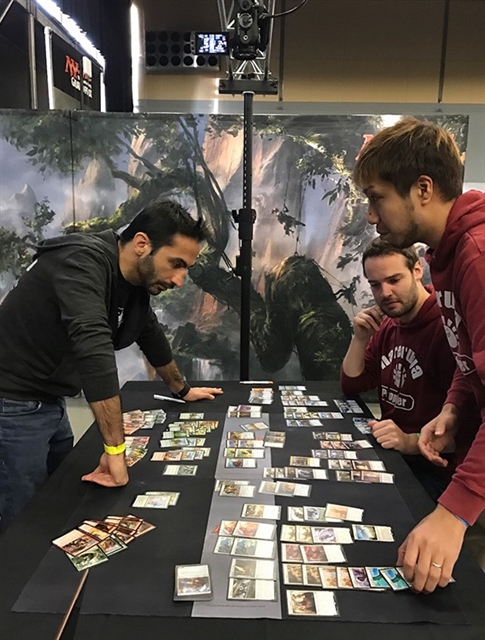
Team deckbuilding is the hardest exercise you can have in magic. You have a lot of possibilities and the time you get to make the best decks combination possible is almost never enough. You should use it really well and save time as much as possible with tests. Before opening the boosters, you should already know who is playing what. Players have affinities with archetypes and colors and team should respect that. Each player will play better if he is piloting a deck he likes. Of course, you don’t know what you will open. This is why you should test team sealed before. For me building as 3 people is wrong. If you use only 2 colors decks and share 1 color, you have 30 combination possibilities. You can’t try all of them.
One should focus of his archetypes and makes the best version possible. Before the Grand Prix, this player should test the format a lot and makes sure his archetype is deep enough to get it in almost every sealed. In case he can’t makes the deck, he should have a plan B deck. Both deck archetype should be makeable in most sealed pools. With good preparation, this player can make his deck really fast. After that the number of possibilities for the 2 other decks become 9 and it becomes easier for the 2 other players to find the best combination.
4. Communication
Communication between teammates is very important for team tournaments. It is something to use but not abuse. Make sure it does not give free information to the opposing team. It can be used for bluffing if your teammates all have the same idea.
Even if you are not speaking in English, still take care. Some people can speak multiple languages and will sometimes understand what you say to your teammates.
Most of the time, players ask for advice about whether to mulligan or not. It is a tough decision but don’t ask your mate if you should keep or not every game. People who do that mostly do so because they don’t want to take the responsibility of bad luck on the next few draws. But if you ask, it’s because you know why it’s risky. You can calculate the probability and don’t have to bother your teammates. It is better to be good enough to take the decision by yourself.
It is difficult to give advice in a game where you miss the start of it. Your teammate has more information than you from previous games or turns of this current game. Giving bad advice to your teammate can be really bad for the game and for the remainder of the tournament might decrease his faith in you. You should really focus when you are helping your teammates game and dont give unsolicited advice unless you are 100 % sure he will make a mistake.
5. Other things to keep in mind
Shuffling
Take care when you shuffle, opponent’s teammates can see the bottom card of your deck because of the view angle. Especially if you are player B.
Player seating
People think a lot about matchups, fast or slow decks to determine the seats but for me the most important is having player B be the guy who is the most easily able to play his own game while also suggesting good plays for the rest of the team.
Out of time, draw result.
Having 3 matches simultaneously increases the chance of a draw. Because communication between teammates increase the odds a lot as well. So, make sure both you and your opponent play in a timely fashion.
Conclusion
People matter more than anything. Playing in a team should give you an edge and not a disadvantage. If you dodge the team traps and if you have the motivation to win for your team and for yourself, in this order, there should be no reason to not have a good time and the odds will be on your side.
My two best results so far for Team Grand Prix were in Barcelona and Rotterdam. Each time, we had a clear strategy before starting with the deckbuilding.
Barcelona Team: Raphael Levy and Melissa Detora
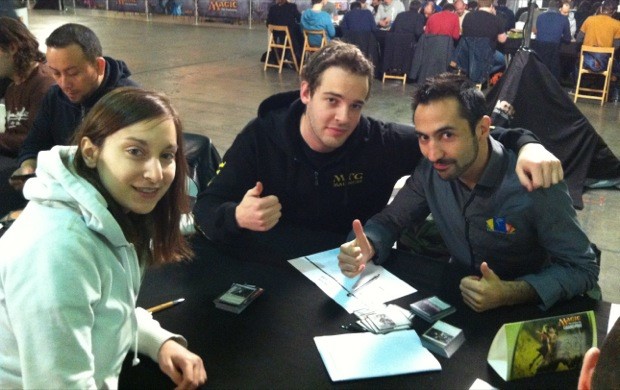
It was in Theros sealed. Raphael just won the 2013 World Magic Cup with the French team. Team sealed is by far his best format. He is a master of deckbuilding for team sealed. Melissa had a record of 19 wins to 5 loses in her last 24 Pro tour Draft matches before the Grand Prix. Hard to not trust her limited skills.
I was the white-X Aggressive player with main option Red-White. This Draft strategy in Theros got me a 6/0 at Pro Tour Dublin. Melissa was the Black-X control player and Raphael the joker player who used the remaining cards. We had this strategy before opening the product.
We finished 7th at the Grand Prix. It was a great experience. We never got to team up together again because Melissa is now working for Wizard of the Coast and can’t play MTG tournaments.
Rotterdam Team: Raphael Levy and Tomoharu Saito
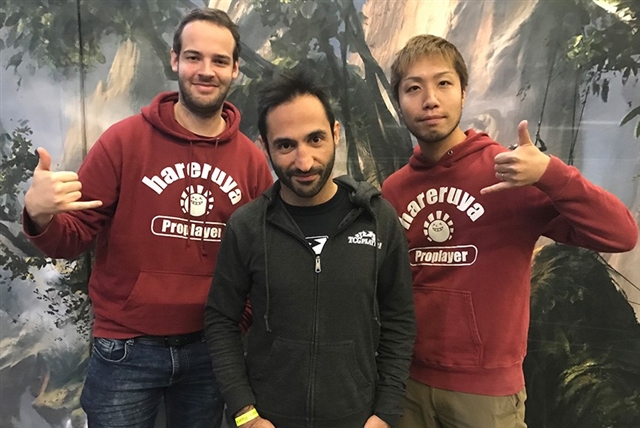
Tomoharu Saito has 23 Grand Prix top 8 with 4 Grand prix wins Raphael has 21 Grand Prix top 8 with 6 wins. Then there is me with “only” 10 Grand Prix top 8 with 2 wins, so in general hard to not have great confidence in the team.
It was Kaladesh sealed. I was the Blue White control player. Tomoharu and Raphael were both joker players who built the two other best decks possible with the remaining Jund colors.
We finished 3rd at Grand Prix Rotterdam. We have already decided to play together for Grand Prix Lyon in November this year.
My team in Grand Prix Sydney on June 23-25, 2017: Tomoharu Saito and Lee Shi Tian
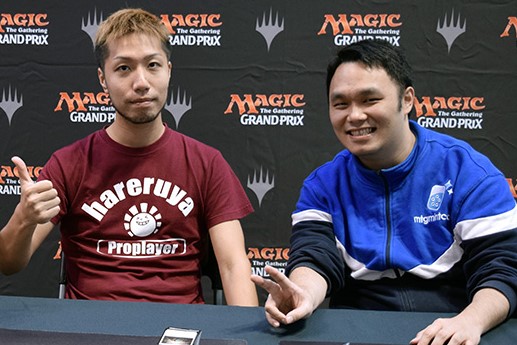
I never play a team Grand Prix without Raphael Levy. So, the thing which scared me is the deckbuilding part. But Tomoharu showed me that he is also great in deckbuilding for team sealed during Grand Prix Rotterdam. Also, I think he is the best player I saw in Amonkhet limited so far and his top 4 at Grand Prix Beijing was definitely deserved.
Lee Shi Tian is also a master in Amonkhet limited, with his own well-defined strategy. He is one of the strongest player I test with in my MTG career and I have absolute confidence in his skills.
I am feeling like I will be the key player for this team. If I am doing well personally during that Grand Prix, I can’t imagine this team not doing well too. I will have to work hard before the Grand Prix to be good enough at Amonkhet Team sealed.
Thank you for reading,
Jeremy DEZANI
Recommended Items
Share in Twitter
Share in Facebook



